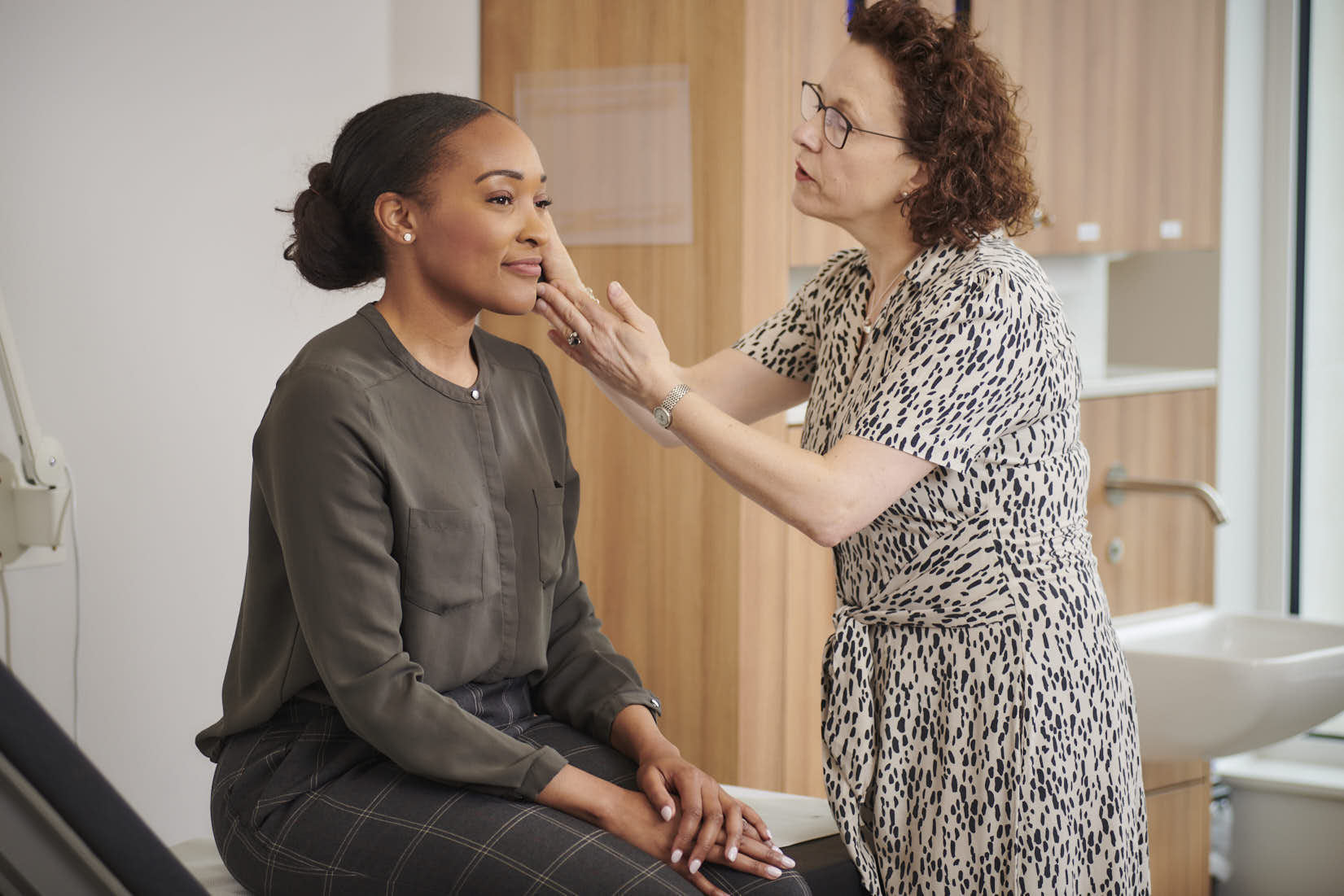
Dr Derrick Phillips
Specialist expertise: Acne, Rosacea, Eczema, Psoriasis, Melasma, Dermatology, Cosmetic Dermatology, Hyperhidrosis, Skin Tag Removal, Skin Cancer, Skin Surgery, Paediatrics.
Basal cell carcinoma (BCC), sometimes called rodent ulcer, is the most common form of skin cancer. Learn what BCC is, its causes and how it is treated.

Basal cell carcinoma (BCC), sometimes called rodent ulcer, is the most common type of skin cancer, accounting for around 75% of all skin cancer diagnoses.
It’s a type of non-melanoma skin cancer that develops from cells in the hair follicle. Under the microscope, the cancer cells have a characteristic appearance and colour that resembles the cells in the deepest layer of your skin, known as the basal layer.
The difference between melanoma and non-melanoma cancer is important to distinguish – melanoma develops from new or existing moles and has a higher risk of spreading to other parts of the body, while non-melanoma cancer develops from damaged skin cells in sun-exposed areas of skin, and is less likely to spread.
It’s important to have any changes in your skin checked by a specialist as soon as you notice them. While the NHS generally offers rapid diagnostic appointments for skin cancer, more and more patients are finding that wait times to be seen are getting longer. In some cases, basal cell carcinoma patients are waiting for several months for surgery to have their lesion removed.
At OneWelbeck, we understand that once you suspect or have had a diagnosis of basal cell carcinoma, you will likely want to have it removed and treated as soon as possible. At our private dermatology clinic, our skin cancer specialists provide rapid diagnosis and treatment for basal cell carcinoma so that you receive the care you need, when you need it.
Learn more about the types of skin cancer and meet our dermatology specialists.
Most cases of basal cell carcinoma are thought to be caused by long-term exposure to ultraviolet (UV) radiation from sunlight, with the condition most commonly observed on areas of skin that are exposed to the sun, such as the face, arms and legs.
Several other factors can also elevate your risk of developing basal cell carcinoma, including:
The appearance and characteristics of basal cell carcinomas can vary, but changes in the skin often look like:
On white skin, basal cell carcinoma often looks like a bump that's skin-colored or pink. On darker skin, it commonly looks like a brown or glossy black bump with a rolled border.
If you notice any changes to your skin, we advise that you make an appointment with a dermatologist as soon as possible.
The diagnosis of basal cell carcinoma is relatively straightforward. During a consultation at OneWelbeck, your dermatology specialist will ask you questions about the skin changes and assess the area of concern with a special instrument called a dermatoscope. If cancer is suspected, they will take a biopsy to confirm the diagnosis and identify the type of skin cancer present.
Surgery is the most common treatment for basal cell carcinoma, with the aim being to remove the cancer completely. In 95% of cases, surgical removal will cure basal cell carcinoma.
Surgical options include:
Other treatment options available at OneWelbeck include:
While treatment is often successful, complications of basal cell carcinoma can include:
As with any type of cancer, early detection and proactive treatment of basal cell carcinoma are key to a positive outcome and a reduced chance of recurrence. At OneWelbeck, we’re able to offer rapid access to appointments, with next-day bookings often available. This means you can be seen by one of our specialists as soon as you notice any changes in your skin.
With all consultations and treatments held in our state-of-the-art facilities in central London, we provide comfortable, convenient and advanced healthcare that you can rely on. Committed to your care long-term, our consultants also ensure you leave our care with all the information you need to reduce your risk of recurrence and the need for further treatment.
If you’ve noticed any changes in your skin, get in touch today to book an appointment with one of our leading consultant dermatologists.
Dr Derrick Phillips consults on general skin conditions including acne, rosacea, eczema, psoriasis and melasma. With hundreds of surgical hours, Dr Phillips offers a range of treatments for skin tags, skin lesions and skin cancers. He has an interest in cosmetic dermatology and offers facial rejuvenation treatments.